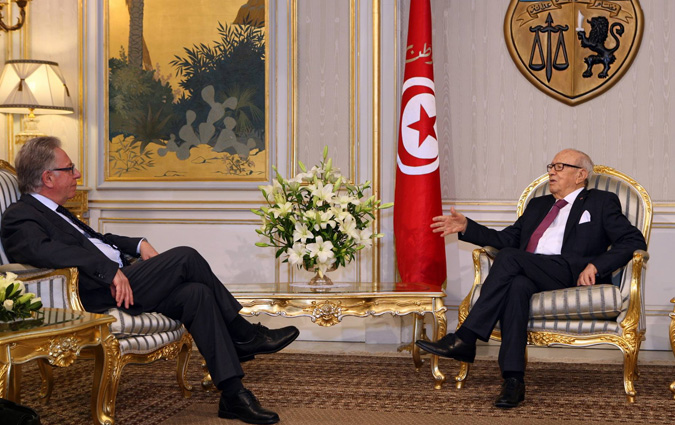Cooperation between Tunisia and the Council of Europe


Mr Beji Caïd Essebsi meets Mr Gianni Buquicchio, President of the Venice Commission (European Commission for Democracy through Law)
The main objective of cooperation, in line with the Council of Europe’s policy towards its neighbouring regions, is to assist Tunisia in the process of democratic changes underway by helping the country to tackle challenges related to human rights, the rule of law and democracy and in particular:
to consolidate the achievements of the cooperation implemented since 2012 through the “Neighbourhood Cooperation Priorities with Tunisia 2012-2014” and to initiate new areas of co‑operation in line with national reform priorities, based on the demand-driven approach, in the fields of Council of Europe expertise;
- to continue the efforts made to facilitate the creation of a common legal area between Europe and Tunisia, encouraging the authorities to bring Tunisian legislation into line with European and international standards and to ratify the Council of Europe conventions open to non-member states, with due regard for the procedures set out in the relevant conventions;
- to provide support to the development and to the effective implementation of new legislation in accordance with European and other international standards according to needs;
- to provide support to the setting up and the effective functioning of human rights institutions and new governance structures;
- to consolidate Tunisia’s presence in Council of Europe’s instances of which it is already a member or observer (Venice Commission, the European Pharmacopoeia, the Pompidou Group’s MedNet network) and in other Council of Europe structures, according to needs.
The present framework of cooperation is a flexible, dynamic strategic tool setting out priorities for cooperation between Tunisia and the Council of Europe for the period 2015-2017. The main areas of cooperation presented have been identified on the basis of high-level consultations as well as of detailed technical consultations between the Tunisian authorities concerned and the Council of Europe.
Consultations have also been carried out with other international organisations - the European Union (EU) in particular, as the main partner of the Council of Europe’s action in Tunisia - and with bilateral actors, so as to ensure a coordinated approach. Hence, the priority areas of cooperation aim to foster synergies between all the relevant actors in order to avoid duplication.
The implementation of activities foreseen in the Neighbourhood Partnership document has already started, in particular in the framework of the European Union-Council of Europe Joint Programme "Towards strengthened democratic governance in the Southern Mediterranean" (South Programme II, 2015-2017).
The Council of Europe and Tunisia
The relationship between the Council of Europe and Tunisia has been enhanced in the context of the implementation of the Neighbourhood Policy established by the Council of Europe in 2011, making Tunisia a privileged partner in the region.
Further to the fruitful Neighbourhood Cooperation Dialogue held between the Council of Europe and Tunisian authorities and the successful implementation of the Neighbourhood Cooperation Priorities for Tunisia in 2012-2014, the Committee of Ministers decided to give a new momentum to the relationship with this country. Cooperation with Tunisia which shares with the Council of Europe the values of human rights, the rule of law and democracy, is pursued through a Neighbourhood Partnership combining and strengthening the two pillars of the policy – political dialogue and cooperation – along the lines fixed in Istanbul in 2011. The Neighbourhood Partnership offers thus a framework for an “Enhanced Political Dialogue” the intensity of which could reflect the quality of the cooperation between Tunisia and the Council of Europe.
Tunisia, which has always expressed an interest in consolidating dialogue and cooperation with the Council of Europe institutions, welcomed the Committee of Ministers' initiative to open up promising prospects for the enrichment of this mutually-beneficial bilateral Partnership.
 Latest news
Latest news
 Related links
Related links
Council of Europe
CoE and the Southern Neighbourhood
Office of the Directorate General of Programmes









